<Back to Index>
- King of Siam Prajadhipok (Rama VII), 1893
- Emperor of Vietnam Bao Dai, 1913
PAGE SPONSOR
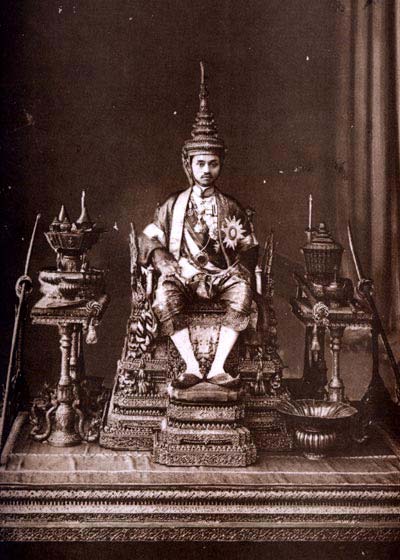
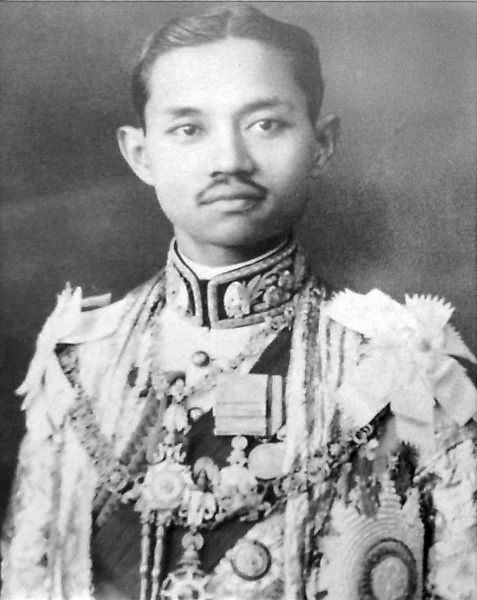
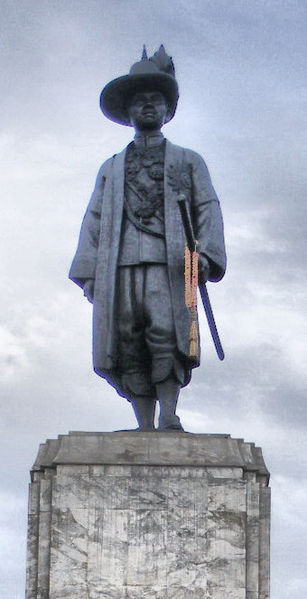
Phra Bat Somdet Phra Poramintharamaha Prajadhipok Phra Pok Klao Chao Yu Hua (Thai: พระบาทสมเด็จพระปรมินทรมหาประชาธิปกฯ พระปกเกล้าเจ้าอยู่หัว) or Rama VII (8 November 1893 – 30 May 1941) was the seventh monarch of Siam under the House of Chakri. He was the last absolute monarch and the first constitutional monarch of the country. His reign was a turbulent time for Siam due to huge political and social changes during the Revolution of 1932. Also he was the only Siamese monarch to abdicate.
Somdet Chaofa Prajadhipok Sakdidej was born on 8 November 1893 in Bangkok, Siam (now Thailand) to King Chulalongkorn and Queen Saovabha Bongsri. Prince Prajadhipok was the youngest of nine children born to the couple, but overall he was the King's second youngest child (of a total of 77), and the 33rd and youngest of Chulalongkorn's sons.
Unlikely
to succeed to the throne, Prince Prajadhipok chose to follow a military
career. Like many of the King's children, he was sent abroad to study,
going to Eton College in 1906, then to the Woolwich Military Academy from which he graduated in 1913. He received a commission in the Royal Horse Artillery in the British Army based in Aldershot. In 1910 Chulalongkorn died and was succeeded by Prajadhipok's older brother (also a son of Queen Saovabha), Crown Prince Vajiravudh,
who became King Rama VI. Prince Prajadhipok was by then commissioned in
both the British Army and the Royal Siamese Army. With the outbreak of
the First World War and the declaration of Siamese neutrality, King Vajiravudh ordered
his younger brother to resign his British commission and return to Siam
immediately, a great embarrassment to the Prince who wanted to serve
with his men on the western front. Once home, Prajadhipok became a
high ranking military official in Siam. In 1917 was ordained temporarily
as a monk, as is customary for all Siamese men.
In August 1918 Prince Prajadhipok married his childhood friend and cousin Mom Chao Rambhai Barni, a descendant of King Mongkut (Prajadhipok's grandfather) and his Royal Consort Piam. They were married at the Bang Pa-In Royal Palace with the blessing of the King.
After the war in Europe ended, he attended the École Superieure de Guerre in France, returning to Siam to the Siamese military. During this time, he was granted the additional title Krom Luang Sukhothai (Prince of Sukhothai). Prajadhipok lived a generally quiet life with his wife at their residence, Sukhothai Palace,
next to the Chao Phraya River. The couple had no children. Prajadhipok
soon found himself rising rapidly in succession to the throne, as his
brothers all died within a relatively short period. In 1925, King Vajiravudh himself
died at the age of 44. Prajadhipok became absolute monarch at only
thirty - two. He was crowned King of Siam on 25 February 1926.
As monarch, Prajadhipok was referred to by his reigning name of Phrabat Somdet Phra Pokklao Chao Yuhua (พระบาทสมเด็จพระปกเกล้าเจ้าอยู่หัว) and in legal documents was a more formal Phrabat Somdet Phra Poraminthramaha Prajadhipok Phra Pokklao Chao Yuhua (พระบาทสมเด็จพระปรมินทรมหาประชาธิปก พระปกเกล้าเจ้าอยู่หัว)
Thais today usually call him Ratchakan thi Chet (lit. 'The Seventh Reign') or more colloquially, Phra Pok Klao (พระปกเกล้า), and in English, King Rama VII.
The system of referring to Chakri rulers as Rama (followed by a number)
was instituted by King Vajiravudh to follow European practice.
Relatively unprepared for his new responsibilities, Prajadhipok was nevertheless intelligent, diplomatic in his dealings with others, modest and eager to learn. However, he had inherited serious problems from his predecessor. The most urgent of these problems was the economy. The budget was heavily in deficit, and the royal financial accounts were a nightmare. The entire world was in the throes of the Great Depression.
Within
half a year only three of Vajiravhud's twelve ministers were still
serving the new King, the rest having been replaced by members of the
royal family. While the family appointments brought back men of talent
and experience, they also signaled a return to royal oligarchy. The
King clearly wished to demonstrate a clear break with the discredited
sixth reign, and his choice of men to fill the top positions appeared to
be guided largely by a wish to restore a Chulalongkorn type government.
In an institutional innovation intended to restore confidence in the monarchy and government, Prajadhipok, in what was virtually his first act as King, announced the creation of the Supreme Council of the State of Siam. This privy council was made up of a number of experienced and extremely competent members of the royal family, including the former long serving Minister of the Interior (and King Chulalongkorn's right hand man), Prince Damrong Rajanubhab. Gradually these princes arrogated power to themselves, monopolizing all the main ministerial positions and appointing sons and brothers to both administrative and military posts. Many of them felt it was their duty to make amends for the mistakes of the previous reign, but their acts were not generally appreciated, for the government failed to communicate to the public the purpose of the policies they were pursuing to rectify Vajiravhud's financial extravagances.
Unlike his predecessor, the king diligently read virtually all state papers that came his way, from ministerial submissions to petitions by citizens. The king was painstaking and conscientious; he would elicit comments and suggestions from a range of experts and study them assiduously, noting the good points in each submission, but when various options were available he would seldom be able to select one and abandon others. He would often rely upon the Supreme Council to persuade him in a particular direction.
In 1932, with the country deep in depression, the Supreme Council opted to introduce cuts in official spending, civil service pay rolls and the military budget. The King foresaw that these policies might create discontent, especially in the army, and he therefore convened a special meeting of officials to explain why the cuts were necessary. In his addressed he stated the following:
I myself know nothing at all about finances, and all I can do is listen to the opinions of others and choose the best... If I have made a mistake, I really deserve to be excused by the people of Siam.
No previous monarch had ever spoken so honestly. Unfortunately, many interpreted his words not as a frank appeal for understanding and cooperation, but as a sign of his weakness and proof that the system of rule of fallible autocrats should be abolished.
King Prajadhipok turned his attention to the question of future politics in Siam. Inspired by the British example, the King wanted to allow the common people to have a say in the country's affairs by the creation of a parliament. A proposed constitution was ordered to be drafted, but the King's wishes were rejected by his advisers. Foremost among them were Prince Damrong and Francis B. Sayre, Siam's adviser in foreign affairs, who felt that the population was politically immature and not yet ready for democracy - a conclusion also reached, ironically, by the promoters of the People's Party.
However, spurred on by agitation for radical constitutional change, the King in 1926 began moves to develop the concept of prachaphiban, or 'municipality', which had emerged late in the fifth reign as a law regarding sanitation. Information
was obtained regarding local self government in surrounding countries,
and proposals to allow certain municipalities to raise local taxes and
manage their own budgets were drawn up. The fact that the public was not
sufficiently educated to make the scheme work militated against the
success of this administrative venture. Nevertheless, the idea of
teaching the Siamese concept of democracy through a measure of
decentralization of power in municipalities had become, in Prajadhipok's
mind, fundamental to future policy making. Before practical steps could be taken, however, the absolute monarchy was suddenly brought to an end.
A small group of soldiers and civil servants began secretly plotting to bring constitutional government to the kingdom. Their efforts culminated in the almost bloodless "revolution" on the morning of 24 June 1932 by the self proclaimed People's Party (Khana Ratsadorn - คณะราษฎร). While Prajadhipok was away at Klaikangworn Palace in Hua Hin, the plotters took control of the Ananda Samakhom Throne Hall in Bangkok and arrested key officials (mainly the princes). The People's Party demanded Prajadhipok become a constitutional monarch and grant the Thai people a constitution. He immediately accepted and the first "permanent" constitution was promulgated on 10 December.
Prajadhipok's
return to Bangkok on 26 June dispelled any thoughts the plotters may
have had of proclaiming a republic. One of his first acts was to receive
the leading coup plotters in a royal audience. As they entered the
room, Prajadhipok greeted them, saying "I rise in honor of the Khana
Ratsadorn." It
was a very significant gesture. By Siamese tradition, monarchs remained
seated while their subjects made obeisance. Prajadhipok was
acknowledging the changed circumstances.
The King's relations with the People's Party deteriorated quickly, particularly after the ousting of Phraya Manopakorn Nititada as Prime Minister by the Khana Ratsadon's leader Phraya Phahol Phonphayuhasena.
In October 1933 the maverick Prince Boworadej, a popular former Minister of Defense who had resigned from Prajadhipok's cabinet in protest over the budget cuts, led an armed revolt against the government. In the Boworadet Rebellion, he mobilized several provincial garrisons and marched on Bangkok, occupying the Don Muang aerodome. Prince Boworadej accused the government of being disrespectful to the monarch and of promoting communism, and demanded that government leaders resign. Boworadej had hoped that garrisons in the Bangkok would support him, but their commander ensured that they remained loyal to the government. The Royal Thai Navy declared itself neutral and left for its bases in the south. After heavy fighting near Don Muang, the ammunition short Boworadej forces were defeated and the Prince himself fled to exile in French Indochina.
There is no evidence that Prajadhipok gave any support to the rebellion. Nevertheless, the insurrection diminished the King's prestige. When the revolt began, Prajadhipok immediately informed the government that he regretted the strife and civil disturbances. The royal couple then took refuge at Songkhla, in the far south. The king's withdrawal from the scene was interpreted by the Khana Ratsadorn as a failure to do his duty. By not throwing his full support behind the government's forces, he had undermined their trust in him.
In
1934 the Assembly voted to amend the civil and military penal codes.
One of the proposed changes would allow death sentences to be carried out without the King's approval. The
King protested, and in two letters submitted to the Assembly said
ending this time honored custom would make the people think that the
government desired the right to sign death warrants to eliminate
political opponents.
As a compromise he proposed holding a national referendum on the issue.
Many in the Assembly were angered. They felt the King was implying that the Assembly did not actually represent the will of the people and voted to re-affirm the penal code changes.
Prajadhipok,
whose relations with the Khana Ratsadorn had been deteriorating for
some time, went on a tour of Europe before visiting England for medical
treatment. He continued to correspond with the government, centering on
the conditions under which he would continue to serve. As well as
retaining some traditional royal prerogatives, such as granting pardons,
he was anxious to mitigate the increasingly undemocratic nature of the
new regime. Agreement
was reached on the penal codes, but Prajadhipok indicated he was
unwilling to return home before certain guarantees were made for his
safety, and the constitution was amended to make the Assembly an
entirely elected body. The government refused to comply, and on 14
October Prajadhipok announced his intention to abdicate unless his
requests were met.
The People's Party rejected the ultimatum, and on 2 March 1935, Prajadhipok abdicated to be replaced by Ananda Mahidol. Prajadhipok issued a brief statement criticizing the regime that included the following phrases, since often quoted by critics of Thailand's slow political development:
I am willing to surrender the powers I formerly exercised to the people as a whole, but I am not willing to turn them over to any individual or any group to use in an autocratic manner without heeding the voice of the people.
As an idealistic democrat, the former king had good grounds for complaint. The Executive Committee and Cabinet did not seem eager to develop an atmosphere of debate or to be guided by resolutions of the Assembly.
Reaction
to the abdication was muted. Everybody was afraid of what might happen
next. The government refrained from challenging any assertions in the
King's abdication statement for fear of arousing further controversy.
Opponents of the government kept quiet because they felt intimidated and
forsaken by the King whom they regarded as the only person capable of
standing up to the promoters. In other words, the absolutism of the
monarchy had been replaced by that of the People's Party, with the
military looming in the wings as the ultimate arbiter of power.
He spent the rest of his life with Queen Rambhai Barni in England. At the time of abdication, the couple was living at Knowle House, in Surrey, just outside London. However, this house was not really suitable for his health, so they moved to Glen Pammant, still in Surrey, a smaller house but with more walking space. They remained there for two years. The couple had no children, but adopted the infant grandson of one of King Chulalongkorn's full brothers. (The adopted, Prince Jirasakdi, would later serve as a pilot in Britain's Air Transport Auxiliary. He died when the plane he was flying crashed in 1942.)
They moved again to Vane Court, the oldest house in the village of Biddenden in Kent. He led a peaceful life there, gardening in the morning and writing his autobiography in the afternoon.
In 1938 the royal couple moved to Compton House, in the village of Wentworth in Virginia Water, Surrey.
Due to active bombing by the German Luftwaffe in 1940, the couple again moved, first to a small house in Devon, and then to Lake Vyrnwy Hotel in Powys, Wales, where the former king suffered a heart attack.
The couple returned to Compton House, as he expressed his preference to die there. King Prajadhipok died from heart failure on 30 May 1941.
His cremation was held at the Golders Green Crematorium in North London. It was a simple affair attended by just Queen Ramphai and a handful of close relatives. Queen Ramphaiphanni stayed at Compton House for a further eight years before she returned to Thailand in 1949, bringing the King's ashes back with her.
Written only up to the point when he was 25, the King's autobiography was left unfinished.
Among
the recent Chakri monarchs, particularly Chulalongkorn and Bhumibol,
Prajadhipok emerged with relatively little revisionistic detraction. He
was a hard working, effective administrator who was intellectually equal
to the demands of his office, and whose main failing was to
underestimate the Bangkok elite's growing need for change. As late as
his death in exile, many, as the historian David K. Wyatt puts it,
"would have agreed with his judgement that a move towards democracy in
1932 was premature."
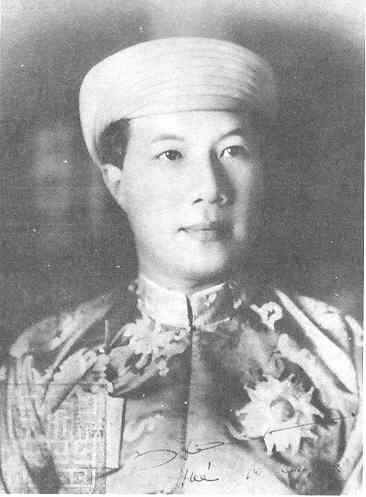
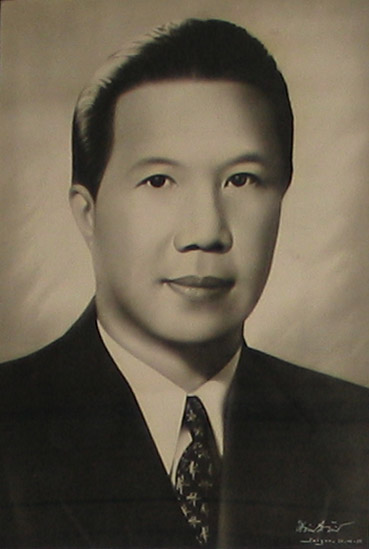
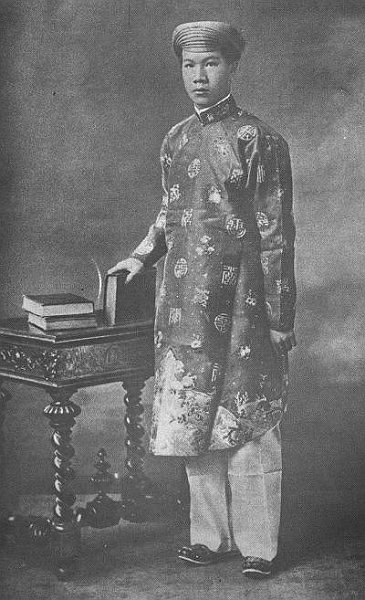
Bảo Đại (lit. "keeper of greatness", 22 October 1913 – 30 July 1997), born Nguyễn Phúc Vĩnh Thụy (阮福永瑞), was the 13th and last emperor of the Nguyễn dynasty, which is the last dynasty of Vietnam. From 1926 to 1945, he was king of Annam under French ‘protection’. During this period, Annam was a protectorate within French Indochina, covering the central two - thirds of the present day Vietnam. Bảo Đại ascended the throne in 1932. The Japanese ousted the French in March 1945 and then ruled through Bảo Đại. At this time, he renamed his country “Vietnam”. He abdicated in August 1945 when Japan surrendered. He was the chief of state of the State of Vietnam (South Vietnam) from 1949 until 1955. Bảo Đại was criticized for being too closely associated with France and spending much of his time outside of Vietnam. Prime Minister Ngô Đình Diệm ousted him in a fraudulent referendum vote in 1955.
Bảo Đại was born Prince Nguyễn Phúc Vĩnh Thụy in the Palace of Doan - Trang - Vien, part of the compound of the Purple Forbidden City in Huế, the capital of Vietnam. He later was given the name Nguyễn Vĩnh Thụy. His father was King Khải Định of Annam. His mother was the king's second wife, Tu Cung, who was renamed Doan Huy upon
her 1913 marriage. She held various titles over the years that
indicated her advancing rank as a favored consort until she eventually
became Empress Dowager in 1933, with style of Her Imperial Majesty added
in 1945.
Vietnam had been ruled from Huế by the Nguyễn Dynasty since 1802. The French government, which took control of the region in the late 19th century, split Vietnam into three areas: the protectorates of Annam and Tonkin and the colony of Cochinchina. The Nguyễn Dynasty was given nominal rule of Annam.
At the age of nine, Prince Nguyễn Phúc Vĩnh Thụy was sent to France to be educated at the Lycée Condorcet and, later, the Paris Institute of Political Studies. In 1926 he was made the king after his father's death and took the name Bảo Đại ("Protector
of Grandeur" or "Keeper of Greatness"). He did not ascend to the throne
given his age and returned to France to continue his studies.
On 20 March 1934, aged 20, at the imperial city of Huế, Bảo Đại married Marie - Thérèse Nguyễn Hữu Thị Lan (died 15 September 1963, Chabrignac, France), a commoner from a wealthy Vietnamese Roman Catholic family. She was renamed as Nam Phương (Southern Scent). The couple had five children: Crown Prince Bảo Long (born 4 January 1936), Princess Phuong Mai (born 1 August 1937), Princess Phuong Lien (born 3 November 1938), Princess Phuong Dung (born 5 February 1942), and Prince Bảo Thắng (born 9 December 1943). She was granted the title of Empress in 1945.
Bảo Đại had four other wives, three of whom he wed during his marriage to Nam Phương: Phu Ánh, a cousin, whom he married circa 1935, and by whom he had one daughter, Princess Claire Phương Tao; Hoang, a Chinese woman, whom he married in 1946; Bùi
Mộng Điệp, whom he married in 1955 and by whom he had two children,
Princess Phương Minh (born 1949) and Prince Bảo An (born 1953); Monique Baudot, a French citizen whom he married in 1972, and who was styled "Imperial Princess" and renamed Monique Vĩnh Thụy. She was known as Empress Thai Phương after her husband's death in 1997. One of his concubines was a dancer from Hanoi, Lý Lệ Hà
In 1940, during the second World War, coinciding with their ally Germany's invasion of France, the Japanese invaded French Indochina. While they did not eject the French colonial administration, the occupation authorities directed policy from behind the scenes in a parallel of Vichy France.
The Japanese promised not to interfere with the court at Huế, but in 1945, after ousting the French, coerced Bảo Đại into declaring Vietnamese independence from France as a member of Japan's "Greater East Asia Co-Prosperity Sphere"; the country then became the Empire of Vietnam. The Japanese had a Vietnamese pretender, Prince Cường Để, waiting to take power in case the new emperor's "elimination" was required. Japan surrendered to the Allies in August 1945, and the Vietminh under the leadership of Hồ Chí Minh aimed to take power in a free Vietnam. Due to his recent Japanese associations, Hồ was able to persuade Bảo Đại to abdicate on 25 August 1945, handing power over to the Việt Minh — an event which greatly enhanced Hồ's legitimacy in the eyes of the Vietnamese people. Bảo Đại was appointed "supreme advisor" to Hồ's Democratic Republic of Vietnam in Hanoi, which asserted its independence on 2 September 1945, but was ousted by the French in November 1946.
As Vietnam descended into armed conflict — rival factions clashed with each other and also with the remaining French — Bảo Đại left Vietnam after a year in his "advisory" role, living in both Hong Kong and China. The French persuaded him to return in 1949 to serve as "head of state" (quốc trưởng), not as "emperor" (Hoàng Đế). He soon returned to France, however, and showed little interest in the affairs of his own country when his own personal interests were not directly involved.
The communist victory in China in 1949 led to a revival of the fortunes of the Việt Minh. The United States extended diplomatic recognition to Bảo Đại's government in March 1950 soon after communist nations recognized Hồ's government. The outbreak of the Korean War in June led to U.S. military aid and active support of the French war effort in Indochina, now seen as anti - communist rather than colonialist.
But the war between the French colonial forces and the Việt Minh continued, ending in 1954 shortly after a major victory for the Việt Minh at Điện Biên Phủ. The 1954 peace deal between the French and the Việt Minh, known as the Geneva Accords, involved a Chinese inspired, supposedly temporary partition of the country into "Northern" and "Southern" Vietnamese administrations. Bảo Đại moved to Paris, but remained "Head of State" of South Vietnam, appointing Ngô Đình Diệm as his prime minister.
In 1955, Diệm called for a referendum to remove Bảo Đại and establish a republic with
Diệm as president. The referendum was widely regarded as fraudulent,
showing some 98% in favor of a republic. Bảo Đại abdicated once again
and remained in exile in France until his death.
In 1972, Bảo Đại issued a public statement from exile, appealing to the Vietnamese people for national reconciliation, stating, "The time has come to put an end to the fratricidal war and to recover at last peace and accord". At times, Bảo Đại maintained residence in southern France, and in particular, in Monaco, where he sailed often on his private yacht, one of the largest in Monte Carlo harbor. He still reportedly held great influence among local political figures in the Quảng Trị and Thừa Thiên provinces of Huế. The Communist government of North Vietnam sent representatives to France hoping that Bảo Đại would become a member of a coalition government which might reunite Vietnam, in the hope of attracting his supporters in the regions wherein he still held influence.
As a result of these meetings, Bảo Đại publicly spoke out against the presence of American troops on the territory of South Vietnam, and he also criticized President Nguyễn Văn Thiệu's regime in South Vietnam. He called for all political factions to create a free, neutral, peace loving government which would resolve the tense situation that had taken form in the country. In 1982, Bảo Đại, his wife, Vĩnh Thụy, and other members of the former imperial family of Vietnam visited the United States. His agenda was to oversee and bless Buddhist and Caodaiist religious ceremonies, in the Californian and Texan Vietnamese American communities. While in the United States, Bảo Đại gauged Vietnamese American opinion, hoping to find a route towards national reconciliation.
Bảo Đại died in a military hospital in Paris, France, in 1997. He was interred in the Cimetière de Passy. After his death, his eldest son, Crown Prince Bảo Long, inherited the position of head of the Nguyễn Dynasty.
The last cash coin ever produced in the world bears the name of Bảo Đại in Chinese characters. There are three types of this coin. Large cast piece with 10 van
inscription on the reverse, medium cast piece with no reverse
inscription, and small struck piece. All were issued in 1933.
- In 1945 when the Japanese colonel in charge of the Hue garrison told Bảo Đại that he had (in line with the orders of the Allied commander) taken measures ensuring the security of the Imperial Palace and those within it against a possible Việt Minh coup, Bảo Đại dismissed the protection declaring "I do not wish a foreign army to spill the blood of my people."
- He explained his abdication in 1945 saying "I would prefer to be a citizen of an independent country rather than Emperor of an enslaved one."
- When, after World War II, France attempted to counter Hồ Chí Minh's popularity and gain the support of the U.S. by creating a puppet government with him, he said "What they call a Bảo Đại solution turns out to be just a French solution."
- In a rare public statement from France in 1972, Bảo Đại appealed to the people of Vietnam for national reconciliation, saying "The time has come to put an end to the fratricidal war and to recover at last peace and accord."